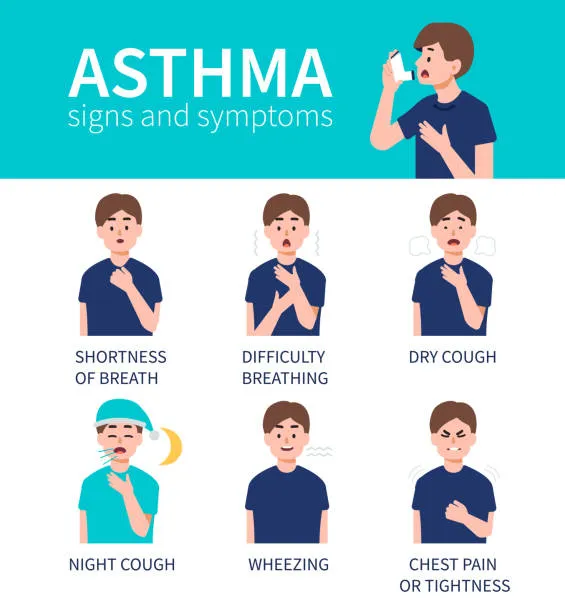Asthma
Asthma is a chronic condition in which the airways that carry air to the lungs become inflamed and narrowed.
Inflamed airways are very sensitive and tend to react to things in the environment called triggers, such as substances being inhaled. When the airways respond, they swell and narrow further, and also produce extra mucus that makes it harder for air to flow into the lungs. The muscles around the airways also tighten, further restricting airflow.
Asthma Symptoms
When the airways react to asthma triggers, what is known as an asthma flare-up or asthma attack can occur. According to the Centers for Disease Control and Prevention, symptoms of an asthma attack include coughing, chest tightness, wheezing, and shortness of breath.
Some people have mild asthma symptoms or only asthma symptoms in response to certain activities, such as exercise. Other people have more frequent and more common symptoms that may need to be treated with medication.
What causes asthma?
The underlying cause of asthma is unknown but is believed to be due to a combination of genetic and environmental factors. People with asthma may have genetic risk factors that make them more susceptible to the disease, and certain environmental factors, such as childhood exposure to allergens or certain viral infections, may increase their risk of developing the disease, according to the National Heart, Lung and Blood Institute (NHLBI).
Triggers can cause asthma symptoms. Common asthma triggers include tobacco smoke, dust mites, air pollution, pollen, mould, respiratory infections, physical activity, cold air, and allergic reactions to some foods.
Asthma Diagnosis
Asthma presents itself in different ways in different people, according to some health practitioners. Sometimes people only find out they have asthma because they have a persistent cough or wheezing and shortness of breath that doesn't go away, which brings them to the doctor.
Asthma can sometimes be overlooked because people think they just have frequent colds or other respiratory infections when they actually have poorly controlled asthma. A patient who has frequent chest colds will likely need to be evaluated for asthma.
In other cases, asthma is wrongly diagnosed in humans, although they don't really have the disease. For example, people who are obese can have asthma-like symptoms,because the extra weight can make the chest stiff and heavy, which in turn makes it harder to breathe. People with acid reflux or nasal allergies can also have asthma-like symptoms.
To diagnose asthma, doctors do a lung function test called spirometry to see if there are any problems with the way the lungs work. This test measures how much air people can expel from their lungs and how quickly they do so, according to the American Lung Association.
Treating Asthma

image source
There is no cure for asthma. People with asthma symptoms should talk to their doctor about how best to manage and treat their condition. Controlling asthma usually involves avoiding asthma triggers and taking medication to prevent or treat symptoms.
The aim of asthma therapy is to make the patient symptom-free. Health practitioners "We want you to be able to do what you want, with no restrictions" and with the fewest possible side effects of the treatment. "People said feel like they have to suffer from the symptoms, but our goal is to eliminate or nearly eliminate the symptoms,
Asthma Medications
There are two types of medications used to treat asthma: quick-relief medications and long-term medications. Fast-acting medications relieve acute asthma symptoms. A common medication for quick relief is inhaled short-acting beta2-agonists, which help relax the muscles around the airways, allowing more air to flow through them. According to the NHLBI, people with asthma should carry a quick-relief inhaler with them at all times in case they need it.
Long-term medications are usually taken daily to prevent asthma symptoms from occurring in the first place. A common medication is inhaled corticosteroids, which reduce inflammation in the airways and make them less sensitive. Other long-term medications include omalizumab, an injection given once or twice a month to prevent the body from responding to asthma triggers, and inhaled long-acting beta2-agonists that help open the airways, according to the NHLBI.
If patients are taking medication for a long time, they should meet with their doctor regularly to assess how well the medication is working or whether the dosage needs to be adjusted.
It's important that people who take long-term medications don't suddenly stop taking them when they're feeling well, because symptoms can return, .People who take their medication constantly take less over the long term because their condition improves and the dose can be reduced, he said.
Asthma in childhood
Anyone can get asthma, but it usually starts in childhood. Of the 25 million people with asthma in the United States, 7 million are children, according to the NHLBI.
According to the American Academy of Allergy, Asthma, and Immunology (AAAAI), most children with asthma develop asthma before age 5. In children, asthma can present as wheezing or wheezing, coughing, rapid or labored breathing, complaints of chest pain, and feeling weak or tired.
Some children with asthma "disappear" as they get older, meaning the condition goes away entirely, .This may happen because people's lungs get larger and more open as they age, and people experience hormonal changes that can also affect asthma risk. On the other hand, people who develop asthma as adults tend to have the disease for life.
"Take care of your lungs and remember nothing else matters if you cant breath"
Thanks you for reading Sayonara 🖐
References/Resources
Reference 1
Reference 2
Reference 3
Reference 4
Reference 5
Reference 6
Reference 7
Reference 8

